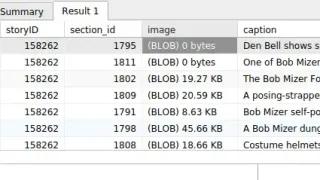October 13, 2014
Reconsidering Hanna(h)
EDGE READ TIME: 6 MIN.
Everyone tells a story to fit their own agenda. Our history has been formed not so much the events that have taken place as by the spin different storytellers have put on them.
Both the Boston Playwrights' Theatre and New Rep's "Next Voices" Fellowship Program have worked for well over a year to help Deidre Girard to tell a story in her new play "Reconsidering Hanna(h)." In its latest iteration, this play is a fully-mounted production, involving some of the best actors in Boston. The production runs through October 19 at the Boston Playwrights' Theatre.
The play follows Hanna, an international journalist who must tell a personal story by using the history of another woman who shares her name. Yet, for the purposes of this play, the only account that matters is the one told by Girard, and that tale is overly complicated and lacking focus.
Events in the life of our protagonist's namesake, Hannah Dustin, have been retold by many people. Feminists and historians find her story empowering, Native Americans find it horrific and racist, and little children use it to terrify each other on dark nights.
The people of Haverhill told the story of a hero, erecting the first public statue commemorating a female in the United States for Dustin. This new mother escaped from the captivity of the Abenaki tribe by slaying 10 Native Americans, including six children, in their sleep; then, well after she was free from harm, she returned to the carnage to collect the scalps of the dead.
Now Hanna must report the story for an unnamed newspaper in her own way. (And for some mysterious reason, she seems to have unlimited time and resources to do this. Not to mention the avid support of an assistant and an encouraging editor. This strains credibility, but we willingly suspend our disbelief.)
Boston audiences were first introduced to the show in April when New Rep staged a professional reading of the play in the black box theatre at the Arsenal Center for the Arts.
Even then the play was rife with controversy --�not because audiences were offended by the subject matter; they were very interested in that. But everyone had their own ideas about how to make the show better, and most of us felt that that it was we who could best prepare Girard's script for its next staging.
In the discussion after that reading, the audience reported that they were fascinated by the historical subject matter, unclear about some on the relationships in the play, loved the way that characters from different eras seemed to cross through space and time to interact with each other, and disagreed about many particulars in the script.
This version concentrates more heavily on the history, clarifies the relationship between Hanna and her editor, beautifully blends two time periods together on one set, and still left members of the audience using adjectives like "racist," "confusing" and "humorless."
This is certainly not for a lack of effort on the part of the production team. Director Bridget Kathleen O'Leary merges two vastly different time periods, and makes scenes filled with antiquated language prickle with drama. By rethinking the ideas of theatrical space, she makes history immediate enough for us to touch it. (She did this same thing remarkable well in her production of "The Other Place" for The Nora Theatre Company and Underground Railway.)
Anthony R. Phelps' set design is a marvelously expressionistic creation that is at once a rustic, modern living room and the suggestion of the woods and wilderness of 17th Century New England.
Celeste Oliva is particularly effective in her dual role as both the journalist and the Puritan with the same name. By refusing to make obvious choices, she is able to bring out interesting nuances that aren't inherent in her character. Early scenes with her editor are explanatory and plodding, but Oliva finds moments of playfulness and familiarity in these scenes that make us feel their relationship has existed for years.
Nevertheless, the character of her editor, Matt (even though he is played by the talented and popular actor and director Barlow Adamson), is thoroughly forgettable. As the stereotypical, good-hearted gay friend, this man ends up being little more than a sounding board for exposition. The only male actor in the play stagnates as a substance-less supporter. This is what male playwrights have done to female characters for years, and it doesn't work in either direction.
The most interesting relationship in the play is between modern Hanna and her fellow journalist, the ambitious and aspiring Joanna (marvelously played by Caroline Lawton).
Hanna has a good reason to blindly hate the unusually helpful and ass-kissing Joanna, except for one thing -- this woman can significantly help the journalist to get her objective. This relationship gives Hanna has a concrete inner conflict. Will she continue to reject Joanna for good reasons, or accept the assistance of her fellow journalist come closer to attaining her goal?
This trajectory of this relationship is built suspensefully and really seems to be developing, but the playwright doesn't follow through, choosing instead to follow another tangent.
Being a playwright shares this with being an actor: Neither can be indecisive. Both must commit. Unless the playwright is a genius of innovative structure (this is extremely rare), she must commit to a narrative, commit to a protagonist and commit to that protagonist's objective.
Ambiguity is a must in good playwriting, because it inspires the imagination. But sloppy, unmotivated action and an unwieldy structure is not ambiguity. It's just a mess.
Hanna, Hannah and Girard are all women who must tell a story in her own way, but physical, societal and psychological pressures impede them. Boston Playwrights' and New Rep's "Next Voices" are working hard to help all kinds of women tell their stories, but it won't do any good unless we get out there and listen.
"Reconsidering Hanna(h)" through October 19 at the Boston Playwrights' Theatre, 949 Commonwealth Ave, Boston. Call 866-811-411 or go to bostonplaywrights.org





